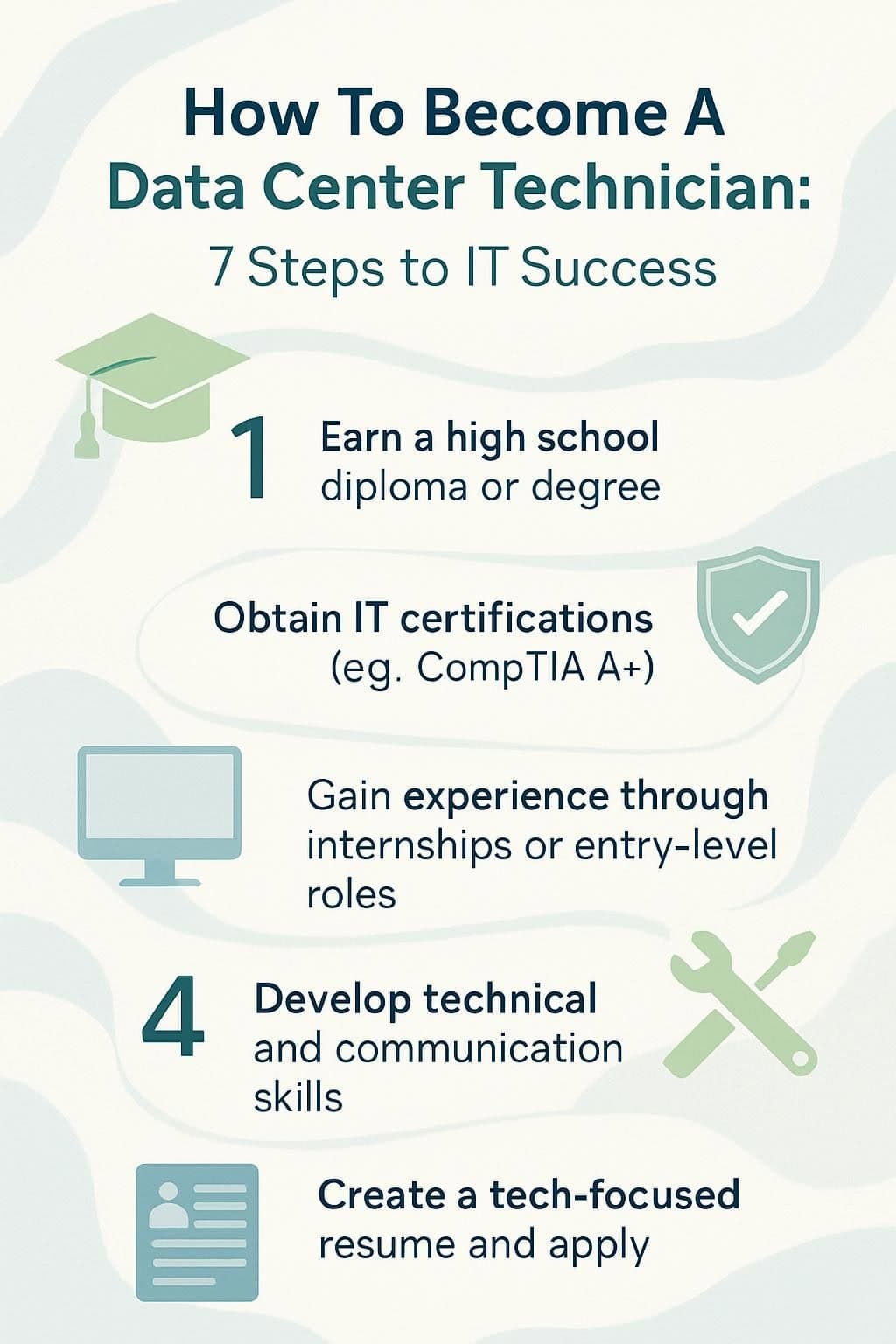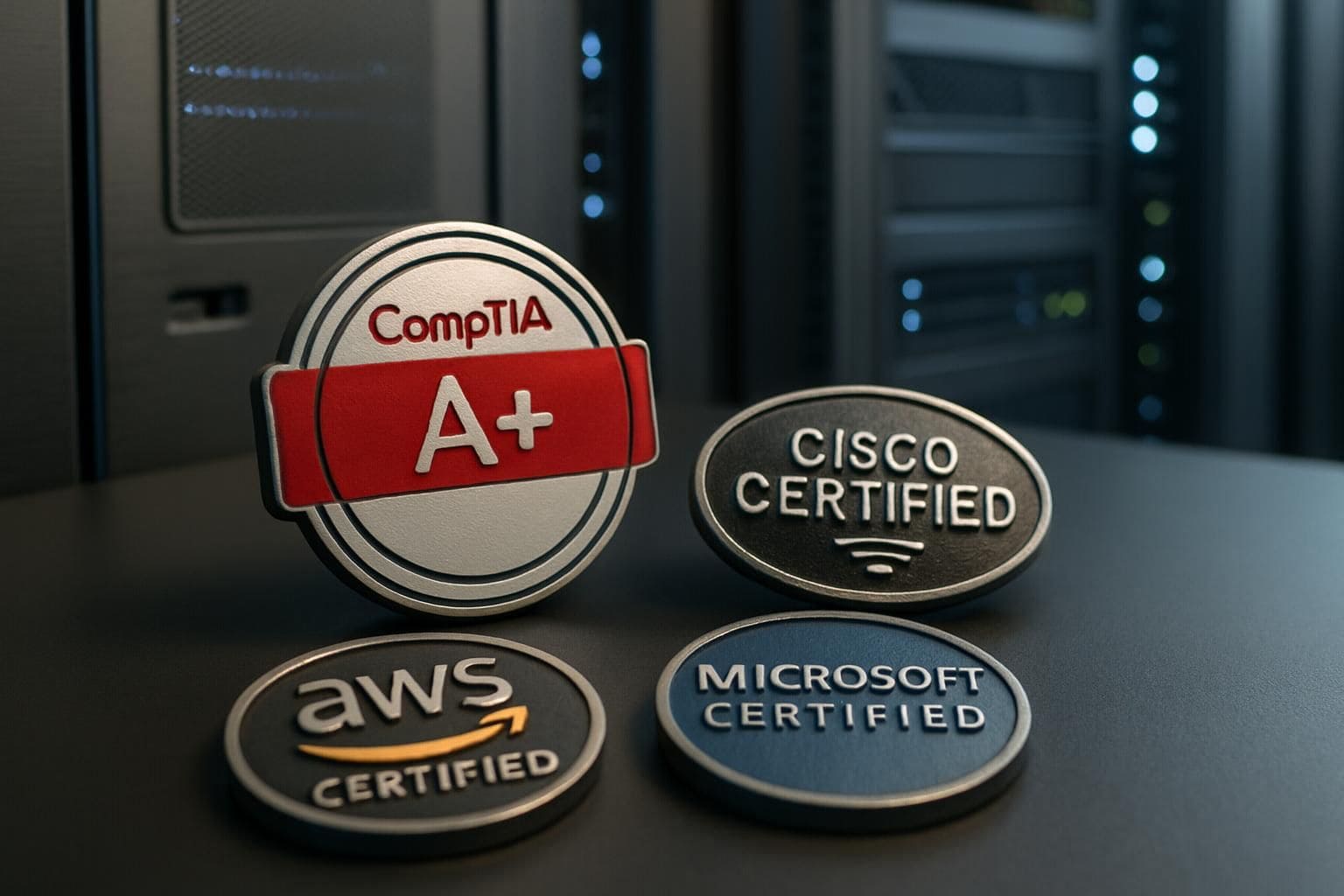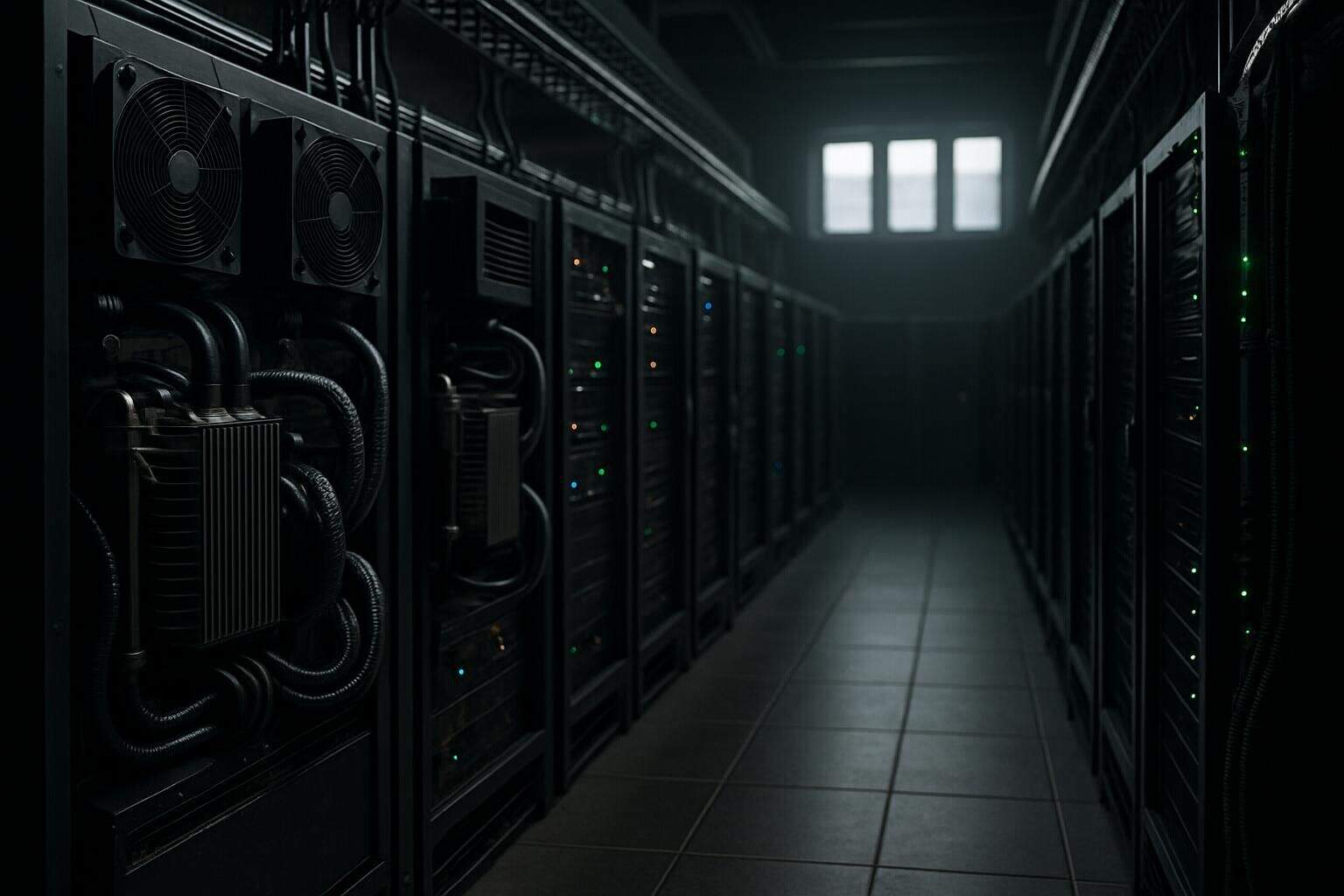Are you stuck in your IT job and wondering how to become a data center technician? Data center technicians keep computer networks and servers running smoothly, helping companies protect sensitive information.
This guide breaks down exactly what skills, education, and certifications you’ll need—giving clear steps to help launch your IT career in data centers. Read on for simple tips that put tech success within reach!
Key Takeaways
Begin by gaining basic IT skills and earning your high school diploma—an associate’s or bachelor’s degree in IT can open even better job opportunities down the road.
Boost your job chances and salary potential by getting valuable IT certifications, such as CompTIA A+, Network+, and Server+, which employers love to see.
Look for internships or entry-level IT roles; they’ll let you practice real-world tasks like fixing servers, managing network setups, and dealing with quick tech fixes.
Develop technical know-how (like hardware repairs and network basics), and sharpen your people skills too—clear speaking, teamwork, and handling the busy pace of data centers.
Craft a clear, tech-focused resume showcasing your IT training, certificates you’ve earned, and specific server skills—then submit it directly to employers or job websites such as LinkedIn.
Table of Contents
What Does a Data Center Technician Do?

Data center technicians keep IT systems running smoothly. They handle installing servers, network devices, and computer hardware to support daily business operations. These specialists solve hardware failures, monitor network speeds, and maintain system security to protect important business data.
According to data center specialists at AmongTech, technicians must carefully safeguard sensitive information and ensure networks operate without a hitch.

The work requires quick reactions and strong troubleshooting skills—fixing technical glitches quickly to avoid costly downtime.
A great data center technician combines technical know-how with problem-solving skills to keep the digital world spinning, even when users don’t realize there was ever an issue.
Key Skills and Qualifications Needed

Data center techs need a mix of hard tech skills and people skills to shine in this fast-paced field. You’ll need to master server hardware fixes, network basics, and quick thinking to solve problems that pop up in busy data centers.
Troubleshooting server hardware

Server hardware problems can bring a whole data center to a sudden halt. As a technician, you’ll need to identify issues quickly—and fix them immediately. You’ll run tests using diagnostic tools to find faulty components, replacing these parts before they cause larger issues.
Most technicians rely on monitoring apps, which send alerts about unusual temperatures or disk failures. You’ll often spend time with the physical servers—checking connections, removing faulty parts, and performing tests—all while under pressure.
Solid troubleshooting means following clear steps to identify the main issue. Start by collecting details about what’s happening. Then, look through logs for error codes pointing clearly at certain components.
After that, test each part carefully until the problem shows itself. Many times, you’ll find the trouble comes down to something simple, like loose wiring or dusty cooling fans. Great data center technicians keep clear and accurate records about repairs, which helps them notice patterns and prevent problems before they happen again.
As you gain experience solving tougher server issues, your IT support skills will steadily improve.
Strong problem-solving abilities

Problem-solving is a key skill for every data center technician. Each day, you’ll tackle tricky hardware issues needing quick thinking—plus common sense. One time, I dealt with a machine randomly shutting down; a tiny buildup of dust was causing it to overheat.
Data center techs must respond fast to equipment problems, or a minor glitch can turn into expensive downtime. Strong troubleshooting skills let you handle maintenance tasks proactively, keeping data safe from loss.
The best technicians don’t just fix problems – they prevent them from happening in the first place.
Strong troubleshooting also supports your cooperation with cybersecurity experts, especially when handling threats like ransomware. You must break complicated tasks into small, clear steps—making them easier to address.
Such analytical thinking helps you identify patterns behind system breakdowns, and allows you to craft effective solutions that improve reliability. Don’t forget, always keep your server room clean, reducing many common issues before they become real headaches!
Communication skills

Clear communication skills can make or break your career as a data center technician. Each day, you’ll need to clearly explain complicated server problems to people who aren’t tech-savvy.
These techs regularly draft easy-to-follow documentation as well as create clear work orders. Turning complicated technical jargon into normal, everyday language helps co-workers and customers grasp what’s going on.
Most technicians mainly concentrate on hardware, but clear Standard Operating Procedures (SOPs) need solid writing skills too.
Technical support often means dealing with stressed-out users or explaining outages to managers. You’ll have to keep your cool—even if you’re walking someone through troubleshooting steps by phone.
The most effective data center techs comfortably switch between detailed IT language for tech teams and clear, simple explanations for regular folks. How fast you move up depends on your skill at documenting procedures and clearly teaching other people about difficult systems.
Educational Requirements

Getting your foot in the data center door starts with the right education – most positions ask for at least a high school diploma, while an IT degree can give you a major edge in the job market.
High school diploma or equivalent
A high school diploma opens the door to jobs in data centers. Most tech companies require at least this qualification for technician roles. To employers, a diploma signals you have basic math, reading, and problem-solving skills—just enough to grasp new technical ideas.
Some data center jobs might even accept GEDs or other similar credentials.
Classes you took in high school like computer science, math, or electronics can help you hit the ground running. Plenty of successful tech professionals started with only their diplomas, later adding certifications such as CompTIA A+ to improve job options.
In the IT infrastructure industry, your practical know-how and experience often count more than advanced degrees. With your diploma and a good combination of technical training and soft skills, you can land some of the coolest IT jobs out there.
Associate or bachelor’s degree in IT or related field
Most data center jobs today expect more than just a high school diploma. A two-year associate degree gives you essential knowledge right away. Many tech companies like this shorter track—it provides hands-on skills such as network setup and server upkeep.
I started my career with an associate degree and landed job offers quickly.
Bachelor’s degrees take four years, offering deeper studies in computer science and information technology. With this path, you’ll gain advanced skills in areas like virtualization or security architecture.
The extra education usually means better starting pay and quicker paths to promotions. Both degrees should offer practical lab work with real servers and networking equipment. Local tech colleges often team up with nearby data centers, offering internships that can lead directly to full-time employment.
Certifications to Boost Your Career

Earning the right tech badges like CompTIA A+ can boost your data center career path and open doors to higher-paying jobs in IT infrastructure — check out these key certifications that will make your resume stand out to recruiters.
CompTIA A+
The CompTIA A+ certification is a perfect starting point for IT professionals interested in data center careers. To earn this credential, you’ll need to pass two separate exams: Core 1 (220-1201) and Core 2 (220-1202).
I began my tech career with this very certification—it covers essential skills, from troubleshooting hardware issues to managing operating systems. Holding an A+ demonstrates you have what’s needed to repair computers, configure networks, and identify basic security threats.
Many data centers list this certification as a requirement for entry-level jobs. The exam covers practical skills you’ll actually use every single day on-site. In my first year working on server racks, my A+ training proved helpful nearly every shift.
And here’s the great part—this credential can lead directly into more advanced certifications, boosting your IT career growth and earning potential.
CompTIA Network+
CompTIA Network+ is a certified must-have for anyone aiming to become a data center technician. It proves that you have solid skills in network setup, troubleshooting issues, and basic security measures.
Hiring managers in IT often seek this certification first, since it signals that you can manage real-life network challenges. The exam assesses your knowledge of routers, switches, and protocols—all crucial to smooth data center operation.
Getting your Network+ credential strengthens your resume and can even lead to a higher entry-level salary in IT roles. Most technicians earn Network+ after getting the CompTIA A+ certification, but before moving onto higher-level cloud computing courses.
Gaining this certification equips you for everyday tasks, like solving connectivity problems and managing local area network setups inside rack cabinets.
CompTIA Server+
The CompTIA Server+ certification is a key credential for data center technicians who handle servers every day. This certification proves you understand managing servers in both hybrid and on-premises setups.
I earned my Server+ last year—and almost immediately saw a boost in job offers. The exam (SK0-005) covers server hardware, virtualization, and disaster recovery—all essential skills for today’s IT roles.
Server+ certification doesn’t just validate your knowledge; it opens doors to advanced roles in data center management that would otherwise remain closed.
Through the Server+ course, you learn specific skills such as troubleshooting hardware problems, creating RAID setups, and applying essential security measures. A lot of technical colleges now weave Server+ training into their IT programs, giving students direct, usable tech skills to handle server-related tasks.
Compared to general entry-level certifications, Server+ zeroes in specifically on server repair and maintenance tasks, making it an ideal match if you’re focused on data center careers.
Cloud certifications
Getting cloud-certified with big providers like AWS, Azure, and Google Cloud instantly boosts your career options. These credentials show you can manage actual cloud systems, the type many data centers rely on these days.
Employers usually prefer technicians with at least one cloud certification, since these skills help you handle virtual servers and storage setups. Earning certifications proves you’re comfortable with both hardware and virtual environments—exactly what data centers need today.
Your certification choices should match your professional objectives. Start out with a general cloud credential, then gradually move into specialty areas—like security or networking—to strengthen your skillset.
AWS has nine different certification tracks, and Azure offers several certifications based on specific job roles. Beyond improving your resume, these certificates directly boost your earning potential in data center careers.
Gaining hands-on training helps you apply cloud skills easily to everyday workplace scenarios.
Hands-On Training and Experience

Real-world practice beats classroom learning every time in the data center world. You’ll need to get your hands dirty with actual servers and network gear through tech internships or starter IT jobs.
Internships in IT infrastructure
IT infrastructure internships give you practical, hands-on server knowledge—something textbooks alone can’t offer. My first internship was at a small data center; in just three months, I gained more practical insight than in a full year of coursework.
You’ll handle real servers, storage devices, and networking equipment, while learning valuable maintenance and repair skills. Most internship programs run about three to six months, pairing you with experienced system administrators who share useful daily tips.
What’s great is that companies often treat internships as test runs for future roles—giving interns a real chance to impress. My mentor taught me strong technical writing habits, and even introduced me to important contacts within the IT field.
Practical internship experience makes your resume pop, particularly if you’ve tackled projects involving cloud solutions or network management.
Try searching for an internship with clear, structured training in data center operations—not one limited to basic duties.
Entry-level technician roles
Entry-level tech roles are ideal starting points for tech enthusiasts aiming to jump into data center careers. Common entry positions include junior technicians, Network Operations Center (NOC) assistants, and help desk support staff.
These jobs help you build practical skills—like basic server upkeep, managing cables, and replacing hardware parts—all while senior team members guide your growth. Most companies expect you to have some fundamental IT know-how, but they’ll provide additional training tailored to their specific systems and operations.
Securing your first role matters far more than knowing every skill upfront. Data centers frequently hire recent college grads, especially those holding CompTIA certifications and solid problem-solving skills.
Typically, entry-level positions involve rotating shifts, since data centers operate around the clock, every day of the week. Hands-on moments with servers, cooling equipment, and network components offer valuable insights beyond what classroom courses alone can provide.
Combining your education with real-life experience sets a solid foundation for growing your career within the IT infrastructure field.
Steps to Becoming a Data Center Technician

Becoming a data center tech takes clear steps that build your skills from the ground up. Start with basic IT knowledge, add some hands-on server experience, grab those CompTIA certs, and you’ll be ready to jump into this growing field.
Develop an interest in IT infrastructure
Kick off your tech adventure by exploring how data centers actually work. Experiment with old computers lying around your house—you can even build a basic server or set up your own home network.
Plenty of tech enthusiasts start exactly this way. Also, check out free online courses covering server hardware basics or cloud computing systems. YouTube videos and podcasts offer loads of useful tips on data center technology—without the textbook boredom.
For even more hands-on advice, drop into forums like Reddit’s r/sysadmin or IT-focused Discord groups.
Local meetups, tech events, and tours of data centers can fire up your enthusiasm. Most larger cities regularly hold tech gatherings, letting you chat directly with professionals who manage servers every day.
Go ahead, ask them about tasks they handle and problems they solve. Developing skills in cloud services, networking basics, and system maintenance early on gives you an advantage later.
Your curiosity about how devices link together naturally builds a solid foundation for your future career in data center technology.
Pursue formal education
Once your interest in IT systems grows, it’s time to start learning. Formal education gives you the exact skills employers want. At minimum, you’ll need a high school diploma to enter this field.
Many data centers prefer hiring candidates who hold a bachelor’s degree in computer science or something similar. Technical schools offer valuable programs that focus heavily on computer networking and practical IT skills.
These courses teach you basic server management, network protocols, and hardware troubleshooting skills.
Community colleges provide affordable two-year degrees, perfect for landing entry-level IT positions. I attended a technical college and gained useful hands-on training and theory that still helps me daily in my data center job.
Plus, many schools partner with tech companies to offer internships, allowing students to earn valuable workplace experience. Online courses through platforms like Coursera or Udemy provide cost-effective ways to expand your skill set without attending full-time college.
Combining classroom instruction with practical experience creates a strong starting point for a successful tech career.
Gain relevant certifications
Certifications give you proof of your tech skills—more convincing to employers than just your word. Employers in tech especially trust certifications like CompTIA A++, Network+, and Server+, because they confirm your skills in hardware fundamentals, network basics, and server management.
Cisco’s CCNA shows solid networking knowledge, while VMware Certified Professional demonstrates your comfort with virtualization tasks. These credentials act like your personal tech passport, helping you land data center roles even without years of job experience.
Earning these certifications takes some study time and exam costs, yes—but the payoff in career opportunities makes it worthwhile. Most data center job listings tag these certificates as “required”, so if you skip this step, your job choices shrink.
Begin with the CompTIA A+ to build a solid technical base, then gradually add more specialized credentials as your career advances. After that, find internships or entry-level positions to gain hands-on training.
Real-world practice strengthens your certification-backed knowledge and skills.
Build a strong resume
Your resume should clearly stand out for IT roles. Start strong by listing your top tech skills—mention the server hardware, cloud platforms, and networking tools you’re good at.
Keep job history entries short and punchy, highlighting results like “Reduced server downtime by 15%” or “Managed over 200 rack units“. IT recruiters skim resumes for clear skills and proven outcomes, not lengthy paragraphs.
Any data center projects from classes or personal experiments count as valuable experience. Even routine maintenance for your own home network shows hiring managers your hands-on skills.
Also, pay close attention to formatting—use neat layouts and bullet points, so your tech abilities immediately grab attention.
Apply for data center technician jobs
Excited about landing a data center job? First, craft a tech-oriented resume highlighting your skills in server hardware and IT knowledge. Clearly outline CompTIA certifications, and mention any direct experience with equipment repair and maintenance.
Sites like Indeed and LinkedIn regularly post fresh data center jobs—but company careers pages also offer direct openings worth exploring. Reaching out directly helps too; I once landed an interview after messaging a data center manager on LinkedIn, asking specific questions about their hardware needs and infrastructure setup.
Technical interviews usually involve troubleshooting scenarios, so review common server issues and refresh basic cloud computing concepts. Hiring managers often test both your technical knowledge and your ability to handle pressure.
At my very first data center interview, I had to diagnose a live server issue right in front of the interview panel—talk about being put on the spot! Keep applying daily, track every submission on a simple spreadsheet, and follow up every few weeks to show continued interest.
The IT industry changes quickly—but being consistent and persistent will help you stand out and land that data center role.
Career Progression and Opportunities

Your data center career won’t stop at the technician level. Many pros move up to team leads or shift to specialized roles in network architecture or cloud systems.
LLM: I’ve written two sentences about career progression and opportunities for data center technicians. The text is casual, active, and at a 7th grade reading level (Flesch-Kincaid).
Advancing to senior technician roles
Career advancement at data centers offers a straightforward path—tech pros who work hard tend to succeed. Most beginners start by handling simple server tasks, and within three to five years, they typically move into senior roles.
Higher positions mean more responsibilities, increased earnings, and opportunities to run important projects. To get there, you’ll have to learn advanced systems, including cooling solutions and power distribution units.
Many data centers offer mentorship programs, too, helping you build leadership qualities along with your technical skills.
The most important factor in moving upward is continuous learning. Experienced technicians often focus on specialized areas such as network architecture or security management. Earning advanced certifications—especially in cloud technologies or AI setups—can help you stand out from your competition.
Many businesses even cover tuition costs to help their tech specialists continue their education. Staying updated with new tech trends and sticking with challenging problems can put you ahead in IT.
Transitioning to data center engineering
Data center technicians can advance into engineering roles once they gain solid hands-on experience. This move leads to higher pay and opens doors to more challenging tasks—like managing large-scale networks and cloud systems.
In fact, I began as a technician repairing servers, then moved up to designing entire data center layouts. Often, you’ll need extra certifications in subjects like network design or cloud architecture to make this step smoothly.
Many professionals upgrade from an associate’s to a bachelor’s degree in IT to better qualify for these engineering positions. Right now, the skills gap for infrastructure jobs makes shifting into engineering roles a wise choice for long-term growth.
Success here means sharpening your know-how in hardware and software systems equally, while clearly demonstrating solid problem-solving skills.
Average Salary Expectations

Money talks! As a tech geek considering this career path, you’re probably wondering about the cash you can expect to earn. During my years working with data center pros, I’ve seen firsthand how compensation varies based on skills and location.
| Experience Level | Average Annual Salary | Salary Boosters |
|---|---|---|
| Entry-Level (0-2 years) | $45,000 – $60,000 | CompTIA certs, basic network knowledge |
| Mid-Level (3-5 years) | $60,000 – $80,000 | Server+ cert, cloud experience |
| Senior (6+ years) | $71,129 – $95,000 | Specialized certs, leadership skills |
| Lead Technician | $85,000 – $110,000 | Team management, vendor relations |
Geographic location
plays a huge role in pay scales. Tech hubs like San Francisco or Seattle often pay 15-30% above national averages. Some companies offer sweet perks too – on-call bonuses can add $5,000-$10,000 yearly to your total pay package.
Your paychecks grow fatter with advanced certifications. AWS, Azure, or Google Cloud certs can bump your earnings by $5,000-$15,000 annually. Specialized knowledge in cooling systems or power distribution might increase your value by another 10%.
Night shift roles typically come with premium pay rates – usually 10-15% higher than day shifts. Contract positions may pay more hourly but lack benefits that full-time roles offer.
How Will the Data Center Technician Role Evolve in 2025?

Data center jobs will look very different by 2025. Tech workers need to pick up new skills quickly, since cloud platforms are replacing old-school server rooms. Today’s IT companies prefer workers who can manage both physical equipment and virtual systems.
You’ll have to master disaster recovery methods, and stay current on AI tools that track network performance. By 2025, most data centers will partly rely on renewable energy—understanding green technology gives you a clear advantage over your competition.
Professionals who grasp cybersecurity fundamentals will land top roles in this industry. Hackers constantly grow smarter, making your ability to identify threats extremely valuable.
Today’s data infrastructures link almost everywhere, meaning your troubleshooting talents become increasingly vital. The fourth industrial revolution introduces smart, self-fixing systems—but humans who can actively manage such tools stay in demand.
Your future career relies heavily on your ability to adapt through continuous learning, real-world training, and practical experience.
People Also Ask
What education do I need to become a data center technician?
You’ll need technical training, such as vocational courses or Information Technology (IT) programs. Many technicians start with vocational education and training (VET) or Technical and Further Education (TAFE). Schools like Technological University Dublin and Franklin University provide strong academic foundations in IT and related fields.
What skills are important for data center jobs?
You’ll want expertise in repairs, maintenance, inventory control, and data engineering basics. Familiarity with cloud computing, extract-transform-load (ETL) methods, and entry-level knowledge of artificial intelligence can help you stand out. Good problem-solving skills also demonstrate adaptability, something employers highly value.
How can I prepare for job interviews in the data center field?
Practice clearly describing your technical expertise and problem-solving abilities. Before your interview, research the company’s data center projects, sustainability goals, and new technologies. Be prepared to discuss current innovations and green practices that impact the IT industry—this shows commitment and enthusiasm.
Are there opportunities for career development as a data center technician?
Absolutely! IT careers provide excellent paths for growing your skills and responsibilities. You can progress from entry-level maintenance into specialized roles, such as data engineering or cloud computing management. Companies often fund additional education and training for employees showing interest and promise.
Do I need certifications for this career?
Certifications often strengthen your technical profile, making you attractive to employers. Consider respected programs offered by the Institute of Technical Education or IFSP. These qualifications can clearly show employers that your skill set aligns closely with current industry demands.
Where are the best locations to find data center technician jobs?
Major technology hubs typically offer strong job markets, especially regions experiencing rapid tech growth—like Missouri and other parts of the southern U.S. Look for cities and areas investing heavily in sustainable data facilities. Locations announcing recent tech expansions and new data center projects often have many open positions.
References
https://www.trgdatacenters.com/resource/what-does-a-data-center-technician-do/
https://www.123.net/blog/the-essential-guide-to-becoming-a-data-center-technician/
https://www.coursera.org/articles/data-center-technician
https://www.tealhq.com/skills/data-center-technician
https://www.indeed.com/career-advice/finding-a-job/how-to-become-data-center-technician
https://www.comptia.org/blog/your-next-move-data-center-technician
https://www.comptia.org/certifications/a
https://www.newhorizons.com/resources/blog/how-to-get-comptia-network-certification
https://ascentoptics.com/blog/data-center-technician/
https://thinkcloudly.com/blogs/cloud/get-career-in-cloud/
https://www.coursera.org/articles/cloud-certifications-for-your-it-career
https://www.tealhq.com/how-to-become/data-center-technician
https://enhancv.com/resume-examples/data-center-technician/
https://dataxconnect.com/insights-data-center-technician-salary/ (2024-09-20)
